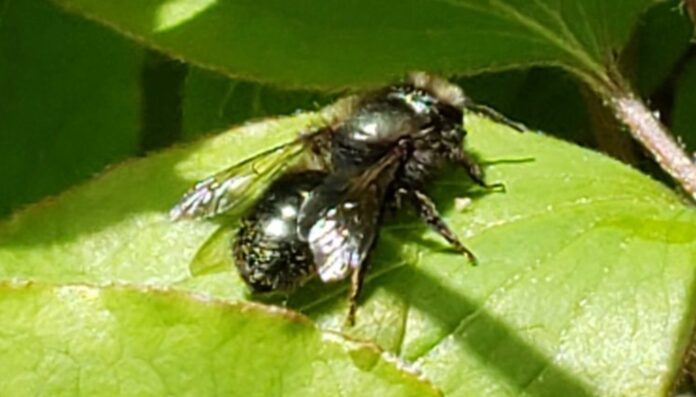Taren Urqhart’s fascination with mason bees started about 30 years ago when she was sitting outside with her dad and she noticed a small black insect living in a drilled hole on the deck.
It turned out to be a species of bee — a mason bee — that, unlike honeybees, are actually native to British Columbia.
She and her dad — now a retired biology teacher — were intrigued, so they set out to learn more about the species.
She has since spent the last three decades raising mason bees and educating people about the fact that honeybees and bumblebees are not the only bees on the planet.

A closeup of a mason bee. (Taren Urqhart)
More recently, Urqhart started working at the West Vancouver Memorial Library, where she and a small team set up a bee tree on the balcony, which proved to be quite popular, which led to a new idea.
“I felt like, wouldn’t it be cool if we could lend bees somehow and get the community really involved?,” she said.
So began the library’s bee lending program, now in its third year.
After attending a 90-minute lecture, participants are eligible to take out a small mason bee house, designed by Urqhart and her dad, that comes complete with dormant bees.
And then borrowers all go on a “one-year journey” with each other.
“You take it home, and all of us …we are all going to raise mason bees for a year,” she said. “And they can ask me questions, send pictures, I send them newsletters. And then next January I invite everyone to come back to return their home.”
Urqhart notes taking care of the bees is actually pretty low-maintenance.

A mason bee at the entrance of a tube in a bee home. (Taren Urqhart)
“It only requires about two hours of upkeep the entire year,” she said. “But if we don’t keep the tubes super clean, they will gather some pollen mites and some other parasites, and by your third year, your colony will be just dead and you will be breeding a bunch of stuff you don’t want.”
Participants will learn all about the insects, which Urqhart says are solitary, gentle creatures who can’t make their own homes.
“They rely on manmade structures mostly, or the occasional woodpecker hole or beetle hole for housing,” she said.
They are also excellent pollinators — better pollinators than honeybees, Urqhart says.
“Of course, we do not manage them to the extent of a honeybee. And honey bees will always be the major pollinating force,” she said. “But mason bees, because they are native to B.C., are really in tune with our early spring blooms, and they can work at much cooler temperatures.”
Urqhart says she hopes the big takeaway from the program will be to make people understand that bees need to be taken care of in ways that are beneficial for them, and that oftentimes, well-meaning beekeepers manage their charges in ways that are “non-natural” for them.
“I’m really trying to add that education piece and trying to make people realise that if we are going to manage nature, we need to really commit to looking after it,” she said.
“You’ve probably seen a lot of the news reports of our bees in peril. And I think that one thing about honey bees they will always be our major pollinating force but we have mismanaged them so horribly over the years. I mean, we put them on trucks at night, whole hives, hundreds of hives on conveniently giant trucks and we trucked them from monoculture to monoculture. So one week they’ll do squash and then we’ll ship them to watermelon. And then we’ll ship them to almonds. So we’ve we’re asking them to do something so unnatural, and some people are horrible to them. They don’t even collect the honey. They just truck them around and then when they are no longer useful they just burn the hive.”
She is quick to point out that not all beekeepers do this, but she called bees “the battery chicken of the insect world.”
“We’re just asking them to do so much for us all the time,” she said.
To anyone hoping to borrow some bees, it is too late for this year, but those interested can sign up to take the course next year, and participants don’t even need a library card.
“[But I do] for fun, put a barcode on the side of the library houses to kind of make it look like they’ve actually borrowed it, but they’re actually not tied to the system,” she laughed. “So I have lost a few in the past. But for the most part, people are very good and bring them back and tell me what’s going on.”
There is no cost associated with taking part.



